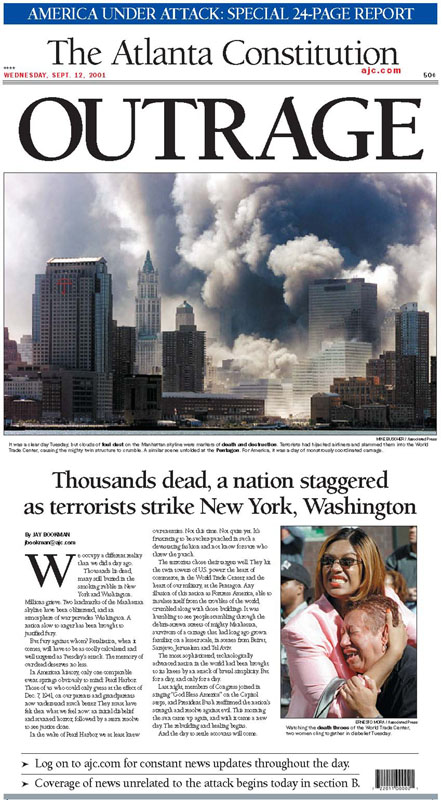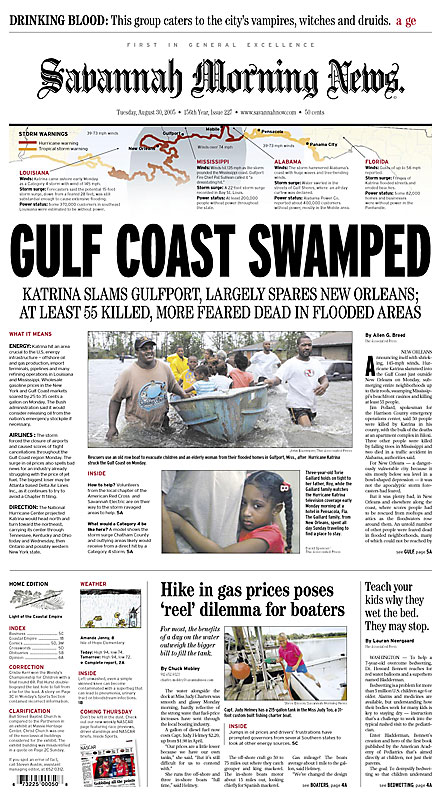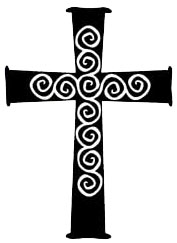|
The Rev. Frank
Logue
Hitting Rock Bottom
It is a daunting task to do justice to the complexities of each of these events and the deep emotions they bring up for us. Each of you no doubt remembers where you were as you heard the news of the terrorist attacks of four years ago. Then there was the unbelievable footage of the twin towers collapsing that was repeated again and again on the news. We watched and watched again, not quite able to believe the enormity of it at first. More recently, having missed destruction from four hurricanes last season, we watched in horror as Katrina devastated the Gulf Coast. And once again the images of loss and despair are difficult to believe all at once—thousands dead, tens of thousands displaced, in an epic disaster. The two tragedies—September 11 and Hurricane Katrina—form such a complete picture as the first was a man-made disaster, the second occurred naturally, with the storm forming as storms did long before their was a New Orleans. And while the knowledge and memory of these two stories are the main context which we all share this morning, they are not the only things on our minds. Many of us have smaller tragedies, closer to home. Certainly, there are a number of us here today grieving for parents, spouses, children, and other loved ones whose deaths would not make the news beyond the obituary page. And there are other small tragedies as well, lost jobs, broken marriages, dreams differed, which are no less a part of the context in which we gather. This is, of course, always true, but it is hard to avoid turning our thoughts to making sense of the pain and loss we feel when gathering on September 11, a day marked by suffering. Jesus was once asked to comment on two tragedies that had occurred. Luke’s Gospel tells us, About this time Jesus was informed that Pilate had murdered some people from Galilee as they were sacrificing at the Temple in Jerusalem. “Do you think those Galileans were worse sinners than other people from Galilee? He asked. “Is that why they suffered? Not at all! And you will also perish unless you turn away from your evil ways and turn to God. And what about the eighteen men who died when the Tower of Siloam fell on them? Were they the worst sinners in Jerusalem? No, and I tell you again that unless you repent, you will also perish.” (Luke 13:1-5) The leading theology of Jesus’ day was that when tragedy struck, it was God’s punishment for sin. But Jesus asked if the ones who were killed were the worst sinners in Galilee or Jerusalem. The answer was no, the disaster had not surgically removed the worst of sinners and left the rest unharmed. In the first case, some people were killed while worshipping in the Temple, offering sacrifices for their sins. It would be as if someone today was killed in the middle of saying the confession in church. One would not imagine this would be when God would strike. So, Jesus rejected the idea that bad things happen as punishment by God for sins. Certainly some bad things happen because of sin, like being injured in a wreck when you drove drunk. But as often as not, the harm comes to someone who was either doing no wrong, or doing nothing worse than most anyone else. I have certainly heard some people expounding on the idea that Katrina’s damage to New Orleans was God’s retribution for the notorious sins of that godless city. What of the righteous people along the Gulf Coast. Surely this was no targeted storm which only harmed evil people. In our reading from the letter to the Romans this morning, Paul warned against speaking in this way, Why do you pass judgment on your brother or sister? Or you, why do you despise your brother or sister? For we will all stand before the judgment seat of God. For it is written, “As I live, says the Lord, every knee shall bow to me, and every tongue shall give praise to God.” So then, each of us will be accountable to God. Jesus had already turned from that theology of disasters being God’s punishment and offered instead, the idea that tragedies that befall others, can be a reminder to us that we need to turn from what we know to be wrong (that’s what the word repent means) and turn toward God. For life can be uncertain. Yet through faith we can tap into the constancy of God’s love and care and find a different kind of certainty. The certainty we find in life is not that God will keep us from all harm, while only allowing pain to come to really bad people. The certainty we find is God’s abiding presence, even, perhaps especially in times of pain, suffering and loss. A professor of theology at my seminary found himself in a very dark place. His daughter died unexpectedly. One day while playing alone, she accidentally hung herself. Clearly not a suicide, it was very unfortunate accident. He was not going to speak at his daughter’s funeral. But he did decide to take to the pulpit to share from the midst of his pain and loss. Still very much in grief for his daughter, he nonetheless told those gathered, “I have been to the bottom and found it firm.” “I have been to the bottom and found it firm.” When his daughter died, the theologian had cried out to God. And in his dark despair, God comforted him and his family, giving them the strength to bear the seemingly unbearable. He was not left alone. God was there grieving with the theologian and his family in their loss. His loss was real and very painful and God’s presence was just as real and comforting. When he said that he had been to the bottom, he meant it in a way I hope I never have to experience it. I’ve gone through some things and am going through some things now which are very trying. But I have to agree with the professor’s experience, in finding God’s presence and some sense of God’s peace that is beyond understanding even there in the pit of Hell. When life takes you to the bottom, through your fault or no fault of your own, you will find that God is there in the pit of darkness, despair, and loneliness. God may allow you to hit rock bottom hard enough to crack the concrete when you land, but God will never leave you alone. God is a very present help in those times of trouble. What Paul offers us in our reading from Romans is a theology, a way of understanding our lives in relationship to God, that helps us understand times of disaster, either natural or man-made. Paul wrote, We do not live to ourselves, and we do not die to ourselves. If we live, we live to the Lord, and if we die, we die to the Lord; so then, whether we live or whether we die, we are the Lord’s. For to this end Christ died and lived again, so that he might be Lord of both the dead and the living. God’s view of life and death is quite different from our own as God will be present to you whether you live or die. It is this view that Paul holds up. Paul did not have to fear execution for his Christian faith as he knew that whether he lived or died, God would not abandon him. The one God we know and worship as Father, Son and Holy Spirit, is God of both the living and the dead. God of those seemingly forgotten souls whose bodies have yet to be recovered along the Gulf Coast. God of the firefighters, stockbrokers, secretaries and policemen whose earthly bodies were all but obliterated on September 11, 2001. God when tragedy strikes you, or when you feel like part of you has died due to loss in your own life. In all we face, God is present in our suffering and loss and then beyond. For once God created free will for us, the world was going to be a place of pain and loss. We will harm one another and we will hurt ourselves. Yet, God can take any of these hurts and not only heal them, but also make that healing an opportunity for something better to take root. As Paul wrote earlier in his Letter to the Romans, “We know that all things to work together for good for those who love God” (Romans 8:28). Paul did not write, “all things happen because God makes them happen,” or even “all things are good.” Paul explained that God can take anything that happens and make it work together for the good. God is in the redemption business and God has been working for four years to redeem the pain and loss of September 11 and God is working now in the lives of the people of the Gulf Coast to take the grief, the loss, the pain and redeem it for a greater good. God is also taking the little tragedies of our lives, the very real pain you feel that will never make the news, God is taking that tragedy too and working it together for the good. For God is the God of both the living and the dead and whether you live or die, God is present with you. Grab hold of that faith that endures and you will find when life thrusts you to rock bottom, God our rock will be present in a powerful way if you will but open yourself to it. For if you have to go to the bottom, you will find it firm. A firm foundation on which God will once again work together for the good, if you will love the Lord and open up your life to God’s purposes for you. Thankfully, most of us gathered this morning are not in the midst of immediate, personal tragedy. How do these two disasters and the scriptures speak to us? In times in your life when God is blessing you and pain and loss are but a memory of a hurt that has been or is being healed, then you will be given opportunities to reach out to others in love.
While we can not solve all the problems of these great disasters, we can make tangible the thanksgiving we feel for the love God has shown us, in showing people in the midst of loss that they are not alone. For “whether we live or whether we die, we are the Lord’s” and we can be thankful for the chance to show others how God’s people act when tragedy strikes. Amen.
Note: There is a talk from the Questioning Your Faith series online called Why Does God Allow Suffering? which may also interest the reader of this sermon. [1] The German theologian Karl Barth. |

 One
famed theologian
One
famed theologian On
this morning, we gather on the anniversary of the world-shaking terrorist
attacks of September 11, 2001. We also gather in the wake of Hurricane
Katrina, whose effects are no less devastating, and whose recovery may well
take longer than the lengthy recovery from 911.
On
this morning, we gather on the anniversary of the world-shaking terrorist
attacks of September 11, 2001. We also gather in the wake of Hurricane
Katrina, whose effects are no less devastating, and whose recovery may well
take longer than the lengthy recovery from 911. 
